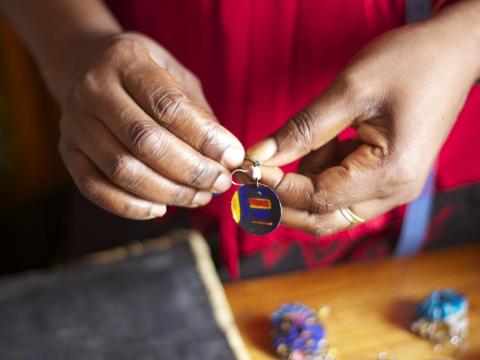Nobel Peace Prize highlights problem of sexual violence in Eastern DRC

Congolese gynecologist Denis Mukwege was honored with the Nobel Peace Prize last week for his work treating female survivors of sexual violence. World Vision DRC and Dr. Mukwege’s Panzi Foundation are longstanding colleagues, working alongside each other to reduce stigma and fight sexual and gender-based violence in South Kivu, where Dr. Mukege’s Maison Dorcas is based. Since late 2017, the two organisations have also been formal partners, combining expertise on a new project which provides targeted music therapy for women and girls who are survivors of sexual violence in North Kivu.
Over 20 years of conflict have caused untold levels of human suffering in the Kivu provinces of Eastern Congo, and vast numbers of women and children have become survivors of gender and sexual-based violence. Local healthcare facilities have been damaged in the decades of violence, and in addition to the physical effects, survivors also suffer from the stigma of sexual violence.
“I’m proud to call Dr. Mukwege a colleague and friend, and am so pleased the Nobel Prize committee is drawing attention to this issue. Sexual violence in conflict is unfortunately all too common in Eastern DRC.” Clarisse Kasaza, WV Protection & Gender Technical Advisor, commented.
“Working with female survivors of sexual violence as we do, it’s been reassuring to be able to refer the more complicated medical cases to Dr. Mukwege’s Maison Dorcas and know that they will receive the care they need. The support that he has provided to our community is immense. Our current project with Panzi addresses not just healing for survivors, but also aims to reduce the stigma that often prevents girls from receiving the help they need.”
Between 1998 and 2016, the UN estimates that 200,000-400,000 women and girls have been raped in the DRC. In 2014 at the Global Summit to End Sexual Violence in Conflict, the situation in the DRC received a lot of attention, but despite some reforms in the years since, more action is urgently needed. Until then, the work of Panzi, World Vision, and other organisations working in Eastern DRC will continue.
Notes:
World Vision has been responding to the humanitarian crisis in Eastern Congo since 1994. Programmes address child protection, sexual and gender-based violence, education, food security, and WASH.
WV applies the Channels of Hope for Gender (CoHG) approach to address violence against women and children. This approach supports faith and community leaders to explore gender identities, gender inequalities and SGBV from a faith perspective. The participation and the engagement of the faith-based leaders to speak out with their peer males in communities about the concept of positive masculinity and the rights of women to be protected and care for has brought a positive mind shift in the communities. Programmes in SGBV also address the stigma experienced by survivors, and livelihood and vocational training for self-reliance.
The current project with Panzi builds on the success of both World Vision’s CoHG programmes and Dr. Mukwege’s Healing in Harmony music therapy modules in an innovative project that helps vulnerable women and young girls who have experienced sexual violence in conflict to process their experiences.
Through the programme, victims of sexually based violence go beyond music therapy to actually record music, which is then shared on social media and local radio stations as part of an effort to reduce the stigma surrounding sexual violence. Initial studies from Panzi’s pilot project in South Kivu have shown the use of music to be far more effective in the healing process than traditional western cognitive-based therapy.